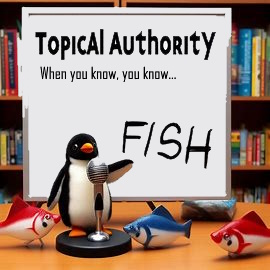The lead post in this series is Mastering Topical Authority: A Comprehensive Guide to Boost Your SEO.
The phrase “topical authority” has kind of an overarching meaning as it is used in SEO and content marketing, but there are interesting and nuanced differences in how some authoritative sources define it.
The reason there are nuances seems to be that despite it being a concept Google pushes as important, they’ve never actually defined what it means, so others fill in the blanks, and different people do so a bit differently.
At it’s core, the phrase refers to a demonstration of expertise, trust, and authority, and it is related to the Google concept of EEAT, which is experience, expertise, authority, and trust.
However, here are some nuances from various sources.
Jump ahead to:
Neil Patel’s Blog
Topical authority is “commonly referred to as a measure of your site’s expertise on a given subject. The more high-quality content you have on a topic, the better your topical authority.”.
“If you have strong topical authority, Google will rank your content on that topic higher than a website with weaker topical authority.”
Clearscope
“Topical authority is a measure of your website’s credibility, and you build it by consistently creating high-quality content about a given subject. The more informative and comprehensive articles you write about a topic, the more search engines, and readers will see you as a subject matter expert.”
Authority Hacker
“The concept of topical authority is pretty straightforward: the better you cover a specific topic across your website, the more likely you are to rank for said topic.
Search engines like Google strive to deliver high-quality content from authoritative sources to their users and they want to do it cheaply to increase their profit margins.”.
SEM Rush
“Topical authority refers to a website’s expertise and credibility on a particular subject.
It’s the trust you build by consistently creating high-quality content around a subject close to your business.”.
Search Engine Journal
“Well, first, authority refers to the power or influence a particular piece of content has over other information on the internet.
In SEO, the higher the perceived authority a page has, the better the chance of ranking well in organic searches.”.
Do backlinks still matter in a world of topical authority?
Yes. the articles quoted and linked to above ALL speak of the importance of backlinks, but in an SEO world where the focus is topical authority rather than backlinks per se, the QUALITY of backlinks matters greatly.
Some say quality trumps quantity, but based on the general tone people use when talking about this, I think it’s fair to say that topically relevant links help a lot, whereas topically irrelevant links help very little, if at all.
From the articles quoted and linked to above:
Neil Patel’s blog
“When you make yourself a topical authority on a subject, you also make it much more likely that other websites will link to your content. The reason for this is partly because you’re seen as the expert on that topic, but also because you rank higher. So when someone searches for a website to cite, you’ll be high on the list.”.
That paragraph implies a belief that to rank you need quality links, and that high quality content is more likely to attract links. Creating a kind of virtuous cycle.
Clearscope
“External topical authority signals include the elements that happen outside your domain and are mostly out of your control. Examples include backlinks and brand mentions on other domains.”.
Again, links from other sites (backlinks) matter.
Authority Hacker
I love this perspective.
“This is largely niche-dependent, but once you establish topical authority, generally speaking, you’ll need fewer backlinks.”.
The implication here is that while you still need backlinks, in the world of topical authority, you don’t need as many.
SEM Rush
“Topical authority also leads to natural link building. More websites are likely to share your content organically, which drives more traffic to your site and potentially increases conversions.”.
Again, links matter, and having high topical authority helps you earn them.
Search Engine Journal
“Topical authority is also a metric that ranks websites according to the quality of information they offer. You can gain topical authority through high-quality content, authoritative links pointing to your website, and social media shares.”
One of the ways you EARN topical authority is through authoritative links (presumably meaning links from authoritative sites) pointing to your content.
In closing
You obtain topical authority through publishing high quality content demonstrating expertise, authority, and trust.
And combine that with links from other high quality content demonstrating expertise, authority, and trust.
Thereby creating a virtuous cycle of your quality content referencing and being referenced by quality content on other sites.
